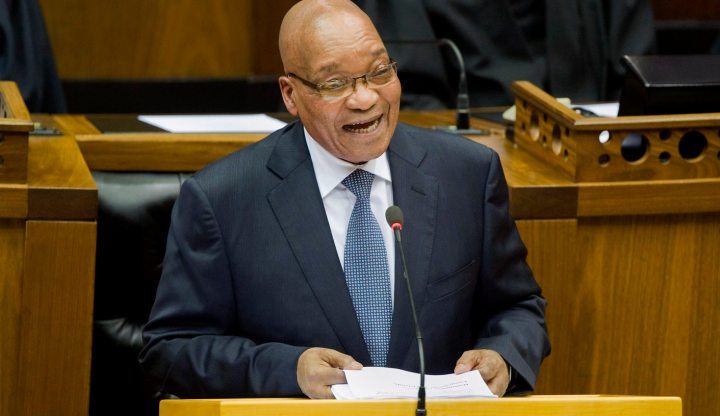South Africa
The State of the Nation: Zuma receives lukewarm response

President Zuma’s State of the Nation address on Thursday night was an opportunity for South Africans to reflect on life in our country. And after the tumult of 2012, such reflection is certainly not unwarranted. But did Zuma’s own reflections on the current state of the nation fit in with what others are thinking? KHADIJA PATEL tested the reaction to Zuma’s speech.
Congress of the People leader Mosiuoa Lekota summed up the prevailing opinion on President Jacob Zuma’s State of the Nation address on Thursday night when he told Talk Radio 702 that the president’s address was “tired” and “lacked energy”. Zuma’s fifth state of the nation address on Thursday was keenly anticipated. And after the tumult of 2012, Zuma was expected to come out on Thursday and show some verve. He was expected to offer fresh solutions to tired problems.
The speech, however, has received a cautious response from opposition politicians, trade unionists and political analysts.
The Democratic Alliance (DA) leader Helen Zille, also speaking on 702 after Zuma’s address, said the president spoke about “a lot of plans”. Critically, however, the Western Cape premier felt Zuma’s report back on the progress of the massive infrastructure development project unveiled during last year’s state of the nation address was misleading. She said, “[Zuma] pulled together every infrastructure project that has been going for years and then presented these projects together to make an impressive list.”
The DA’s parliamentary leader Lindiwe Mazibuko was particularly scathing in her assessment of the address. She said President Zuma had passed up a golden opportunity to present South Africans with a bold new plan.
“Instead, all he gave us was an uninspired version of last year’s SONA, which provides no hope for South Africans crying out for real leadership,” Mazibuko said. “All we heard was more of the same empty promises we have heard before.”
But Mazibuko was not the only one who felt the state of the nation address extended promises that were not fulfilled.
Outside of parliament and away from the carefully scripted theatre of politicians, ordinary South Africans also felt Zuma’s address promised much but would ultimately deliver very little.
Simphiwe Zwane from the Operation Khayisa Movement in Thembelihle, Gauteng, echoed Mazibuko when he dismissed Zuma’s speech, saying, “It is promises year after year.”
Motsosiemang Gadinabokao, a regional secretary of the South African National Civic Organisation, was more upbeat. He said, “It feels like it is repetition of all the older speeches, but in general it is good and addresses some critical issues like the women and children and education.”
Zuma came out strongly on education and he did not avoid the hornet’s nest that is the current debate on declaring teaching an essential service.
The General Secretary of the South African Democratic Teachers Union, Magwena Maluleke, told Daily Maverick that the union welcomed Zuma clarifying what was actually meant by declaring education an essential service.
“By saying education is an essential service we are not taking away the Constitutional rights of teachers as workers, such as the right to strike,” Zuma said. “It means we want the education sector and society as a whole to take education more seriously than is happening currently.”
Maluleke said, “All of us must realise that education is an essential service; what is important is to change mind sets.” His call for a change in attitude towards teaching and the education system lent from what Zuma said in his speech.
“In elevating education to its rightful place, we want to see an improvement in the quality of learning and teaching and the management of schools,” Zuma said. “We want to see an improvement in attitudes, posture and outcomes.”
“We need to acknowledge that education is failing, but blaming teachers who are only one part of the system is unfair,” Maluleke said. He said he was encouraged by Zuma addressing the education system comprehensively. But crucially, as well, he feels Zuma’s establishment of a Presidential Remuneration Commission for teachers safeguards the collective bargaining system.
SADTU, then, appears to have been appeased by President Zuma’s state of the nation address. And if the address fails to do anything else, perhaps the evasion of what might have been a protracted teachers’ strike is in Zuma’s favour.
The Federation of Unions of South Africa (FEDUSA), the largest politically non-aligned trade union federation in the country, was also encouraged by Zuma’s address. “We are positive about the President’s honest reflection on the challenges faced by our beautiful country,” FEDUSA President Koos Bezuidenhout, who attended the proceedings in Cape Town, said in a statement. “It is good when, even at a ceremonial level, we can admit to the things we need to fix in South Africa. The president and his team did a good job at defining the problem, showing possible solutions, and reporting on progress made at various levels,” he said.
The Freedom Front Plus leader Pieter Mulder was, however, not as convinced. Speaking on SABC after Zuma delivered the State of the Nation address, he said that he was particularly disappointed with Zuma’s remarks on agriculture.
Mulder is not alone in his concerns about strategic leadership on agriculture.
Poifo Ramotlatsi, from Black African Young Farmers, said: “It is important for government to invest in young black farmers, especially in rural provinces like the North West. This province is a ticking time bomb, as there are many people who feel they must take back their land, since government’s willing buyer-willing seller [system] is failing.”
But even as Zuma himself acknowledged that something must be done to speed up the process of land reform, whether he actually has the political will to go through with it is another matter altogether. DM
(With additional reporting by Thapelo Lekgowa)
Photo: South African President Jacob Zuma laughs as he delivers his State of the Nation Address after the formal opening of Parliament in Cape Town February 14, 2013. REUTERS/Rodger Bosch


















